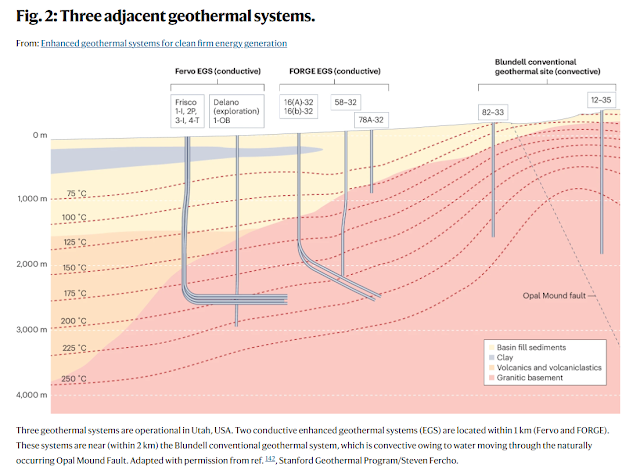Fervo Energy continues to exceed expectations
and drill deeper, hotter, and faster into hot dry rock. Reaching a true
vertical depth (TVD) of 15,765 ft in rock at 520 degrees F in just 16 days. The
drilling speed represents a 79% reduction in drilling time compared to the
DOE’s baseline for such wells. The Sugarloaf appraisal well is an excellent
operational achievement. According to the press release:
“These results expand the window for commercial
viability of EGS into a significantly deeper and hotter regime, paving the way
to deploy the technology outside of the western US.”
“DeGolyer & MacNaughton’s independent estimates of
heat-in-place and reserves involved a comprehensive review of Fervo’s drilling
data, geologic models, and production test results. The report highlights that
Fervo’s proprietary EGS design successfully unlocks thermal recovery factors in
the range of 50 to 60%, tripling the amount of useful thermal energy reserves
compared to conventional geothermal technology. The report confirms that the
Cape Station project area can support over 5 GW of development at depths of up
to 13,000 feet. The new Sugarloaf drilling results are expected to increase
Cape’s resource potential even further.”
“Back in July 2020, we performed our first EGS field
trials at reservoir temperatures of around 300° F,” said Jack Norbeck, CTO and
co-founder of Fervo Energy. “In just a few years, we’ve developed innovations
that enable our technology to operate reliably at temperatures exceeding 500°
F. These drilling results demonstrate that Fervo is operating in the optimal
geothermal conditions for large-scale commercial deployment.”
Fervo is confident in their
enhanced geothermal systems (EGS) projects, which utilize key oil & gas
drilling and completion technologies like PDC bits, multiwell pads, horizontal
drilling, and multistage stimulation. A 2025 paper in Nature Reviews Clean
Technology explains the potential of EGS. Below is a snippet from the abstract.
“Adaptation of advanced drilling techniques (including
the use of polycrystalline diamond compact bits, multiwell drilling pads,
horizontal drilling and multistage stimulation) is enabling an increase in
scale and decrease in cost of EGS projects. As a result, in the USA, enhanced
geothermal is expected to achieve plant capital costs (US$4,500 kW−1)
and a levelized cost of electricity (US$80 MWh−1)
that are competitive with market electricity prices by 2027. With further
development of EGS to manage induced seismicity risk and increase system
flexibility, EGS could provide stable baseload and potentially dispatchable
electricity in clean energy systems.”
Two important issues highlighted in the paper are the potential of EGS to get down in pricing to be competitive with other forms of energy and the dangers of induced seismicity. They also note that EGS has been proven to be effective and long-term in experimental projects in Europe, including in the Upper Rhine Graben, a part of the European Rift system. Geothermal systems as conventional convective and conductive, are distinguishable but can be developed in adjacent areas as shown below.
Improvements in drilling time and effectiveness of stimulation are leading to better economic outlooks for EGS projects.
Fervo and others are studying induced seismicity, which has been
problematic in geothermal wells in Switzerland, Korea, and France, leading to
the cancellation of some projects. They are working to understand the potential
for induced seismicity and the best ways to manage it. We know from oil &
gas issues that it can be managed. However, it may be more difficult to do so
in some geothermal areas.
“Managing unwanted seismicity during hydraulic
fracturing operations remains an ongoing challenge, as there is no simple
formula or action that is guaranteed to avoid the occurrence of a serious event
once seismicity has been initiate.”
Technological
advancements have made EGS more economically viable for the future. If these
advancements continue, the costs can drop further, leading to economic
deployments of EGS.
References:
Fervo
Energy Drills 15,000-FT, 500°F Geothermal Well, Pushing the Envelope for EGS
Deployment. Business Wire. June 10, 2025. Fervo
Energy Drills 15,000-FT, 500°F Geothermal Well, Pushing the Envelope for EGS
Deployment
Enhanced
geothermal systems for clean firm energy generation. Roland Horne, Albert
Genter, Mark McClure, William Ellsworth, Jack Norbeck & Eva Schill. Nature
Reviews Clean Technology volume 1, pages148–160 (2025). Enhanced geothermal
systems for clean firm energy generation | Nature Reviews Clean Technology





No comments:
Post a Comment